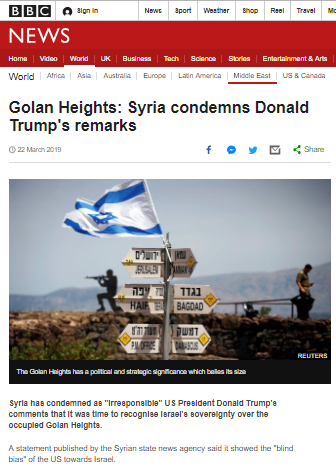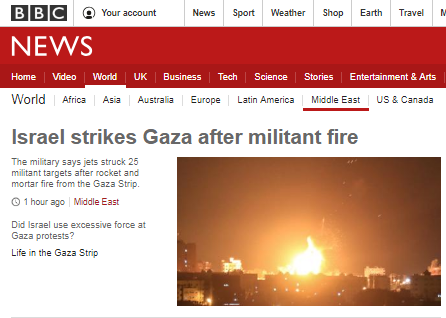In recent days visitors to the BBC News website’s ‘Middle East’ page have found three reports relating to the US president’s announcement of the intention to recognise Israeli sovereignty over the Golan Heights.
One of those reports was written by the BBC’s State Department correspondent Barbara Plett Usher and the other two included inserts of her analysis. All three promoted specific messaging on the topic of international law.
1) Trump: Time to recognise Golan Heights as Israeli territory March 21st:
“Richard Haass, a former senior US state department official who is now president of the Council on Foreign Relations think-tank, said he “strongly disagreed” with Mr Trump. He said such recognising Israeli sovereignty would violate a UN Security Council resolution, “which rules out acquiring territory by war”. […]
So critics have concluded this was a blatant attempt to give Mr Netanyahu a boost in a hotly-contested election.
If so, it’s one that violates important principles of international law, they say: Mr Trump has endorsed the seizure of territory, and will have no moral authority to criticise Russia for doing so in Ukraine’s Crimea.”
2) Golan Heights: Syria condemns Donald Trump’s remarks March 22nd:
“Richard Haass, a former senior US state department official who is now president of the Council on Foreign Relations think-tank, said he “strongly disagreed” with Mr Trump and that the decision would violate a UN Security Council resolution “which rules out acquiring territory by war”. […]
Critics have concluded this was a blatant attempt to give Mr Netanyahu a boost in a hotly-contested election. If so, it’s one that violates important principles of international law, they say: Mr Trump has endorsed the seizure of territory, and will have no moral authority to criticise Russia for doing so in Ukraine’s Crimea.”
3) Trumplomacy on Golan Heights: What it all means March 22nd, Barbara Plett Usher:
“First and foremost is one [question] of international law: in recognising Israeli sovereignty over the Golan, Mr Trump is in effect endorsing its seizure of the territory. By what moral authority then could he challenge others who do the same, such as Russia’s annexation of Crimea?”
As Professor Eugene Kontorovich pointed out in testimony given to the US House of Representatives last year:
“The widely-repeated view that recognizing Israeli sovereignty over the Golan Heights would be contrary to international law is based on one fundamental assumption: that at least since the adoption of U.N. Charter, international law prohibits any acquisition of foreign territory by force. While such a formulation of the rule is largely accurate, it omits crucial exceptions quite relevant to the case of the Golan Heights.
Whatever the current status of an absolute prohibition on territorial change resulting from war, there was certainly no such blanket prohibition in 1967, when the territory came under Israeli control. At the time, international law only prohibited acquisition of force in illegal or aggressive wars. This is evident from the source of the prohibition in the UN Charter, post-Charter state practice, and the understandings of international jurists at the time. There is simply no precedent or authoritative source for forbidding defensive conquest in 1967.
The U.N. Charter prohibits war for most purposes. When the use of force is illegal, it is natural to conclude that any territorial gains from such aggression cannot be recognized as well. Thus the illegality of conquest arises from the presumptive illegality of the use of force. But crucially, the U.N. Charter does not make all war illegal. Indeed, it expressly reaffirms the legality of a defensive war. Since defensive war is not illegal, it follows that the defender’s territorial gains from such a war would not be illegal.”
Notably, readers of the first report were also told that:
“In 2017, Mr Trump recognised Jerusalem as Israel’s capital and ordered the relocation of the US embassy to the city from Tel Aviv. The decision was condemned by Palestinians, who want East Jerusalem to be the capital of a future Palestinian state, and the UN General Assembly demanded its cancellation.”
The second article likewise stated:
“In 2017, Mr Trump recognised Jerusalem as Israel’s capital and ordered the relocation of the US embassy to the city from Tel Aviv.
The decision was condemned by Palestinians, who want East Jerusalem to be the capital of a future Palestinian state, and the UN General Assembly demanded its cancellation.”
Under the heading “How will this affect the West Bank?” readers of the third article were informed that:
“The occupied West Bank is different from the Golan Heights. It was also captured by Israel in the 1967 war, from Jordan.”
As usual the BBC’s presentation of history commences in June 1967 with no mention of the relevant fact that in 1948 Jordan launched an attack on the regions included in the Mandate for Palestine which the BBC terms “the West Bank” and “East Jerusalem” and subsequently illegally annexed both areas.
Predictably, while amplifying Palestinian claims to parts of Jerusalem which were under Jordanian occupation for 19 years, the BBC has nothing at all to tell its audiences about the legality of that particular case of seizure of territory by war.




